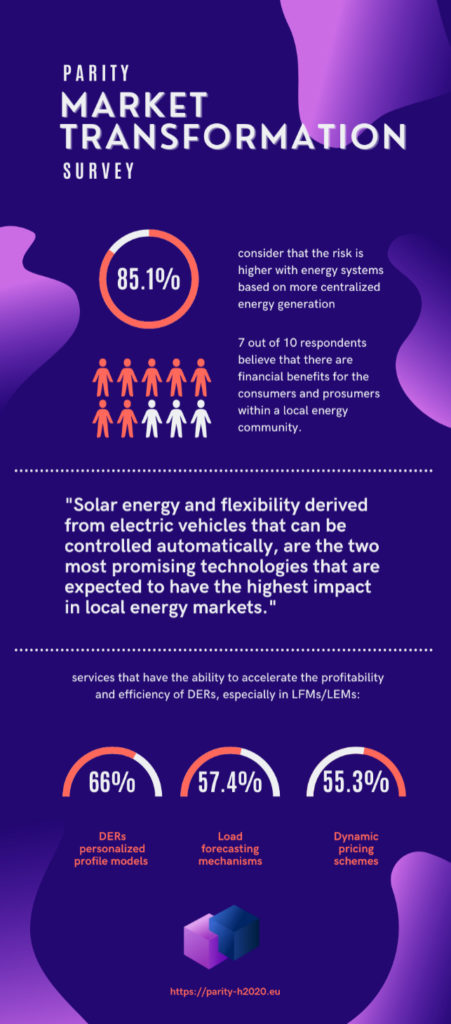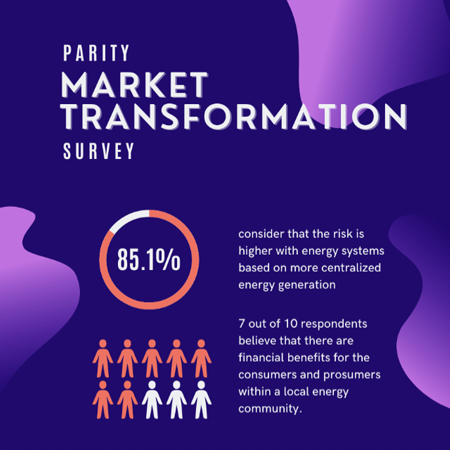During the last months, PARITY partners have extensively surveyed and analysed the energy market, providing market opportunities and threats in key PARITY solutions. From the aforementioned market analysis, it became evident that there is a significant change in the energy market, resulting from a mix of evolving regulations, technologies and customer behavior. Towards this direction, PARITY created and disseminated a survey in order to explore the overall patterns that will form the energy market transformation and the consumer’s perspective on this matter.
The survey aimed to evaluate participants’ opinions on the concepts of LEM and LFM, to identify factors and barriers to the progress of local renewable energy development based on the participants’ knowledge and what would motivate people to participate in such markets. Additionally, the goal of this survey was to analyze the current market needs, as well as investigate what is driving the energy markets transformation and where it is leading. The survey was primary distributed to the PARITY project experts (DSO, Aggregators, Retailers etc.). Afterwards, our target group was mixed, including both the general public and energy experts. The total responses were 50 and their distribution is the following: Spain (16 responses), Greece (12 responses), Switzerland (10 responses), Cyprus (3 responses), Austria (2 responses), Germany (1 response), Sweden (1 response) and 5 responses where the country was undefined.
In the current survey most of the respondents have knowledge/experience in emerging technologies in the energy sector, such as renewable energy, microgrids, smart meters, blockchain and energy storage. Specifically, the majority of the respondents (51,%) has a very strong understanding in such technologies, while only 6,4% of the respondents have heard of them, but not really understand what they are or their benefits.
Some of the most interesting outcomes of the PARITY market transformation survey are presented below:
- The large majority of the sample (85,1%) consider that the risk is higher with energy systems based on more centralized energy “generation”, comparing with the 8,5% of the total sample which thinks is lower and the 4,3% which thinks is the same.
- Regarding possible risks electricity markets based on more centralized generation are facing, most of the respondents state that the highest are the emissions and/or the air pollution. The second risk in line is related to the energy availability and supply risk of the centralized markets, while also cyberattack, bulk generation of energy and the risk of pricing schemes are considered as medium risks as well.
- Since local energy communities are entering the hype, the adoption of peer-to-peer (P2P) electricity trading will turn individual consumers from passive to active managers of their networks. Such a marketplace can relieve constraints on the growing system and offer an alternative to costly grid reinforcements. The above statement is proved also through the survey, considering that 70,2% of the respondents believes that there are financial benefits for the consumers and prosumers within a local energy community (Figure 43). Additionally, a 66,6% percentage thinks that there are attractive business opportunities for new stakeholders, while another 66,6% find it reasonable to participate in such markets due to the increased investment in renewables (e.g. PV) and other DERs (heat pumps, battery storage, EV etc.).
- Solar energy and flexibility derived from electric vehicles that can be controlled automatically, are the two most promising technologies that are expected to have the highest impact in local energy markets, among with the distributed energy storage through battery technologies, which is coming in the third place. On the other hand, off-shore wind electricity generation, nuclear electricity generation and natural gas turbine electricity generation is forecasted to have no impact at all.
- The most important concepts that are foreseen to change the current energy market the electric vehicles, the large-scale centralized renewable energy generation as well as the distributed energy generation. Local energy systems and infrastructure were characterized as medium importance, while the majority of the respondents agree that large-scale fossil fuel power generation will have no importance at all in the near future.
- The majority of the respondents believe that DERs personalized profile models (66%), load forecasting mechanisms (57,4%), dynamic pricing schemes (55,3%) and smart energy contracts (51,1%) are the services that have the ability to accelerate the profitability and efficiency of DERs, especially in LFMs/LEMs.
The detailed survey outcomes are part of the PARITY WP10 and are going to be presented and analysed in deliverable 10.1 Stay tuned for more.


